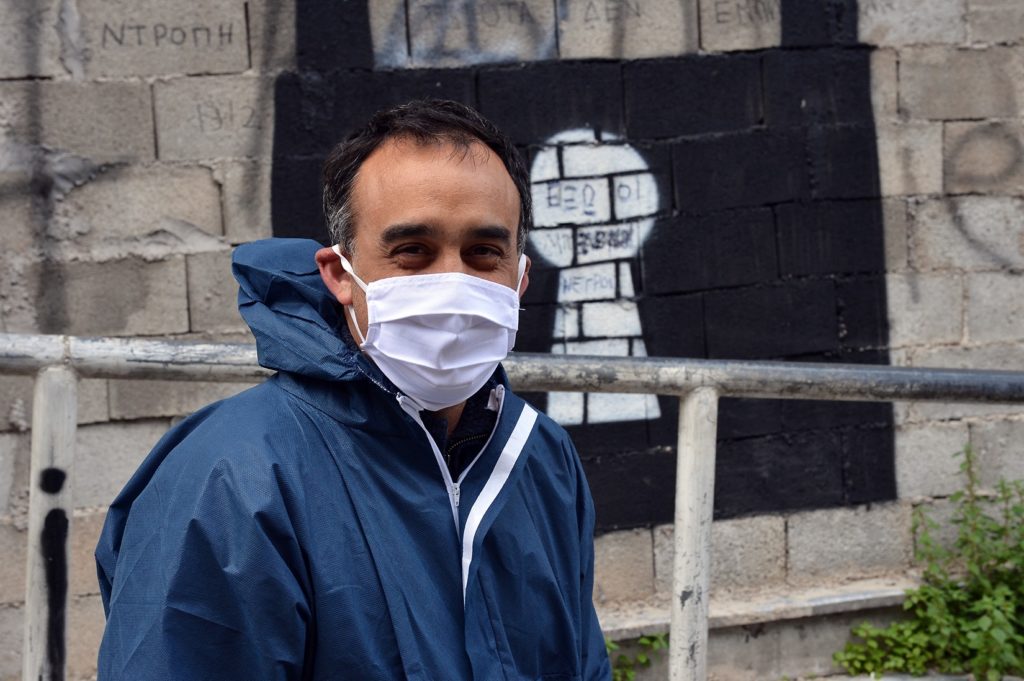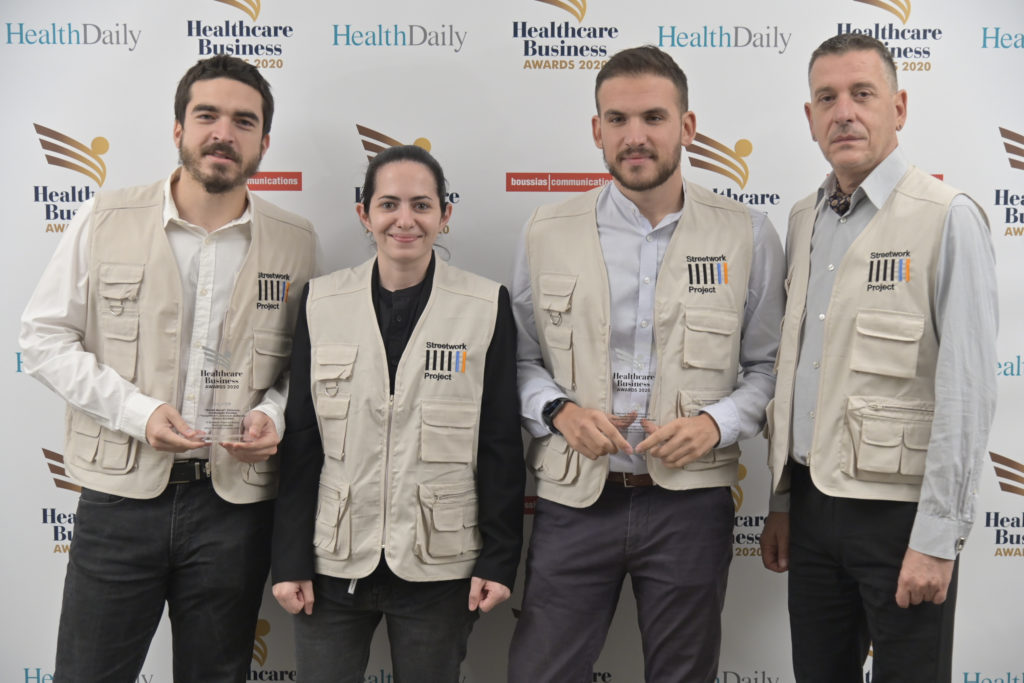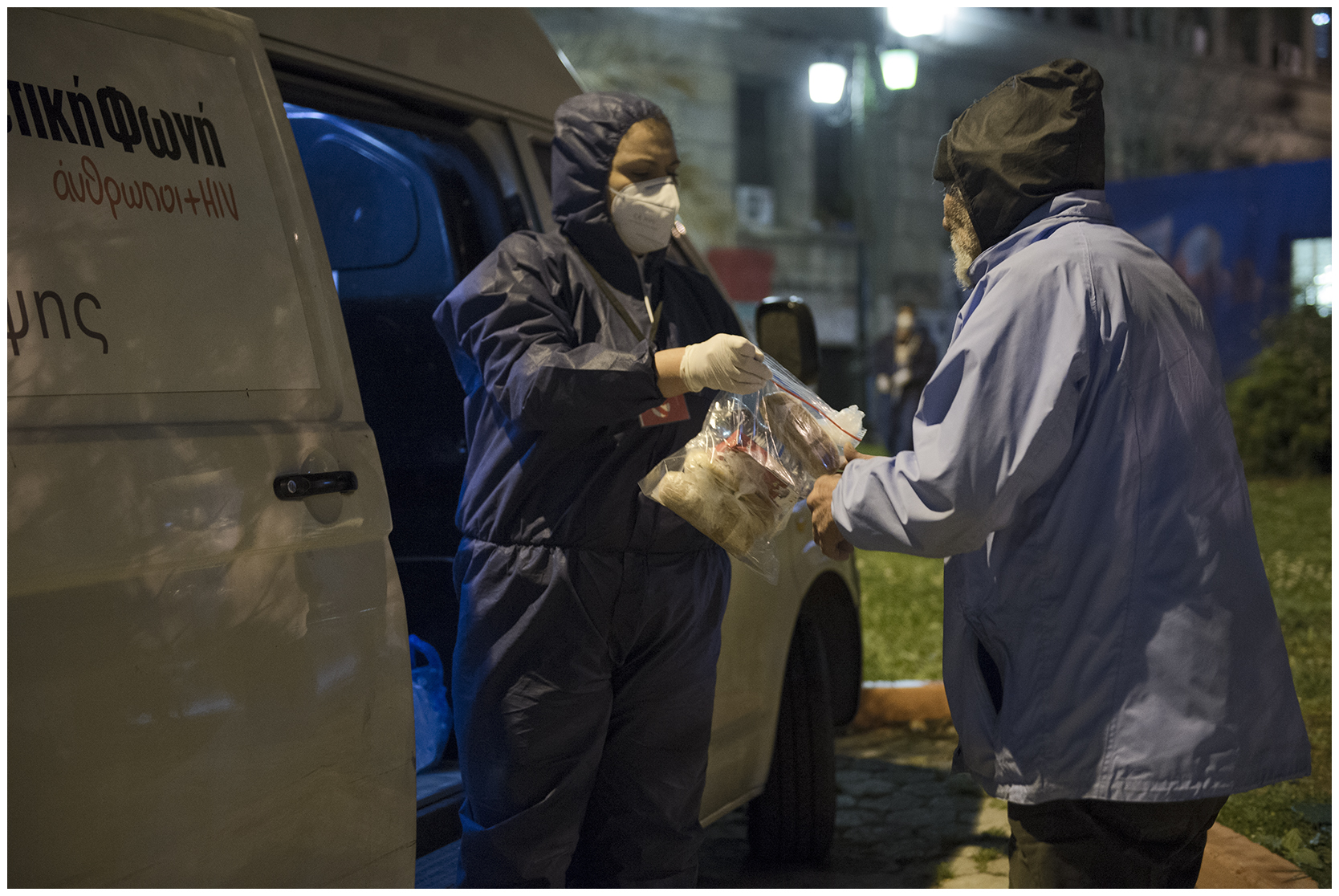Across the globe, the COVID-19 pandemic is spurring cities to find ways to protect groups that are most vulnerable to infection or who exist outside the traditional reach of health care services—including people who use drugs and those experiencing homelessness. Athens, Greece is demonstrating how a city can build on learnings from the pandemic to promote better health for everyone.
Athens has taken purposeful steps to ensure that its residents who inject drugs and are unhoused receive the help they need. This harm reduction work—aimed at reducing negative health outcomes or improving the social outcomes of people who use drugs—began pre-pandemic with education and training on the use of naloxone which can reverse opioid overdose, to people who use drugs, their family members and the health professionals in contact with them. During the current crisis, the city and its civil society partners are further supporting these communities with basic goods, supplies to minimize COVID-19 transmission and educational materials—expertly scaling up its response with support from the Partnership for Healthy Cities.
To learn more, Daliah Heller, Director of Drug Use Initiatives at Vital Strategies, spoke with George Kalamitsis, founding member and chair of the Hellenic Liver Patient Association “Prometheus” (HLPA Prometheus).

George Kalamitsis, founding member and chair of the Hellenic Liver Patient Association “Prometheus”
Athens is the first city to lead an overdose prevention project in the Partnership for Healthy Cities global network. Can you tell us about drug use and overdose in Greece?
Data collected by the Greek Monitoring Centre for Drugs (EKTEPN) describes the stark reality of drug use in Greece. In October 2020, an estimated 3,339 people in the country injected drugs. Figures from 2018 nevertheless indicate that approximately 13,531 people between the ages of 15 and 64 were considered high risk for problematic drug use. The same year recorded 565 emergency incidents related to drug use, a 30% increase from the previous year. This trend was not surprising to us, because we knew that the amount of safe injection equipment available to residents decreased by 25% in the two years prior (from 2016 to 2018). For a person who injects drugs, the danger of opioid overdose in their lifetime is estimated between 30% and 70%.
Because of this ongoing challenge, we enthusiastically welcomed the Partnership for Healthy Cities’ addition of an intervention focused on preventing opioid-associated overdose deaths.
What is the work you do at HLPA Prometheus?
Though the data is discouraging, we are seeing new levels of harm reduction policy and action across Greece and especially in the capital city—informed by consistent efforts from the Municipality of Athens, the Organization Against Drugs (OKANA), the Organization Against Addictions (KETHEA), the Hellenic Scientific Society for the Study of AIDS and Sexually Transmitted Diseases, and HLPA Prometheus. With support from the Partnership for Healthy Cities, our program leans on two main pillars—advocacy and training—with the goal of bolstering the health and human rights of people who inject drugs (PWIDs).
Because the majority of deaths related to drug use are caused by overdose, this coalition of organizations has worked together over the past year to build overdose prevention capacity in the city. Together, we introduced a legal framework for opening a network of drug consumption rooms in Athens. Our partners at OKANA proposed a new law under consideration by the national Ministry of Health, to legalize access to and the use of lifesaving naloxone without a prescription.
At HLPA Prometheus, we are working to implement educational seminars about naloxone to people who are close to someone who injects drugs, such as family members, workers from harm reduction NGOs, and personnel working in public agencies such as prisons and police departments. We have also implemented an awareness campaign teaching community members how to administer naloxone, in an effort to further decrease deaths among the PWID community.
What other services are available for people who use drugs in Athens, and how does your work complement and compare with theirs?
Drug use in Athens has been a growing issue for many decades. Driven by the belief that we belong to the same family serving a common goal, HLPA Prometheus works in close collaboration with every organization in the harm reduction field, exchanging views and practices to ensure the best possible support for our communities.
The Organization Against Drugs (OKANA) and the Organization Against Addictions (KETHEA) provide a range of health services, including harm reduction programs and initiatives, and establish and support linkages to healthcare. Both of these public institutions specifically support people who use drugs in Athens, and throughout Greece.
Other organizations also reach this vulnerable population in Athens. Médecins du Monde deploys mobile units and skilled medical personnel to provide holistic healthcare to marginalized groups, including PWIDs. PRAKSIS is another NGO in the city, providing healthcare to these communities.
In what ways do you and your partner organizations collaborate with local authorities and institutions?
We remain in constant contact and close cooperation with local authorities and institutions on harm reduction work in the city. During the first days of the COVID-19 crisis in March 2020, Athens Mayor Kostas Bakoyiannis invited all local harm reduction organizations to jointly launch an emergency plan for protecting the city’s most vulnerable populations. The following month, Mayor Bakoyiannis announced a collaboration with OKANA, KETHEA and others in the field to develop the first housing program for homeless PWIDs in downtown Athens. The program has since provided housing, access to therapeutic services, healthcare, counseling and legal support, along with programs for social reintegration.
During this time, we worked with institutions and local authorities to gather as much supplies as possible for those PWIDs who were experiencing homelessness, as they were facing extreme conditions on the streets of locked-down Athens.
How has the COVID-19 pandemic affected your work? Tell us about how you responded to community needs in the immediate moment and about how your work is changing as Athens adapts to the “new normal.”
Preventive public health measures to curb the spread of COVID-19 forced the majority of Athenians to stay at home, yet the streets were far from empty. For marginalized groups who spend the majority of their days on the streets, such as PWIDs and people who lack shelter, the lockdown removed access to basic needs like food and water.
HLPA Prometheus responded by launching the Streetwork Project with the Greek Association of People Living with HIV “Positive Voice,” in collaboration with OKANA, KETHEA and the Municipality of Athens. Early into the national COVID-19 epidemic, we assembled a team of staff and volunteers trained in approaching vulnerable or socially excluded populations. Since then, through October 2020, we have distributed over 53,600 food and beverage packages, 15,000 pieces of personal protective equipment, 1,800 safe injection kits, and 400 flyers and city guides with updated information on harm reduction services reaching nearly 11,000 people in Athens. The project has been recognized in Greece by this year’s Healthcare Business Awards and Patient Partnerships Awards.
As we enter a new era, we must take further action and embrace even more those who need our help. By adapting to this “new normal” we ensure not only the sustainability of our programs, but also that no one is left behind—neither during the current crisis nor beyond.

The Streetwork Project received the Silver Award at the Healthcare Business Awards 2020, which recognizes best practices and innovation in the health sector that contribute to improving the quality of life of patients and marginalized populations.
Can you tell us why it is always important to invest in harm reduction services, and even more so, during times of crisis such as these?
The ongoing effects of the COVID-19 pandemic will be felt at both the psychological and economic levels, and we expect to see higher rates of anxiety and depression, and more illegal drug use, as a form of self-medication. In the longer term, we expect the corresponding economic decline will affect the financial viability of harm reduction services, while propelling more of our city’s residents into economic vulnerability. It is likely the years following the pandemic will mirror those following the 2010 financial crisis in Greece, in which we saw large increases in drug use, homelessness and infectious disease (in that instance, HIV), yet decreases in available social services.
What I can say for sure is that the COVID-19 pandemic has underscored the immense importance of collaboration between civil society organizations, local authorities, and the public health system. By strengthening harm reduction services, we bridge major health and social inequalities, while also reducing rates of addiction. The Streetwork Project has taught us that small miracles can happen when local government works directly with civil society organizations during a public health crisis. Let’s continue on this path!
Learn more about the Partnership for Healthy Cities COVID-19 Response: https://cities4health.org/
Follow us on Twitter: @VitalStrat
About the Partnership for Healthy Cities:
The Partnership for Healthy Cities is a prestigious global network of cities committed to saving lives by preventing noncommunicable diseases (NCDs) and injuries. Supported by Bloomberg Philanthropies in partnership with WHO, as well as Vital Strategies, this initiative enables cities around the world to deliver a high-impact policy or programmatic intervention to reduce NCDs and injuries in their communities. For more information, visit: https://partnershipforhealthycities.bloomberg.org/
The Partnership for Healthy Cities COVID-19 Response is part of the $40 million Bloomberg Philanthropies COVID-19 Global Response Initiative. By collaborating with the WHO and Resolve to Save Lives, an initiative of Vital Strategies, the Partnership for Healthy Cities COVID-19 Response is working hand-in-hand with the world’s leading experts on epidemic prevention.
